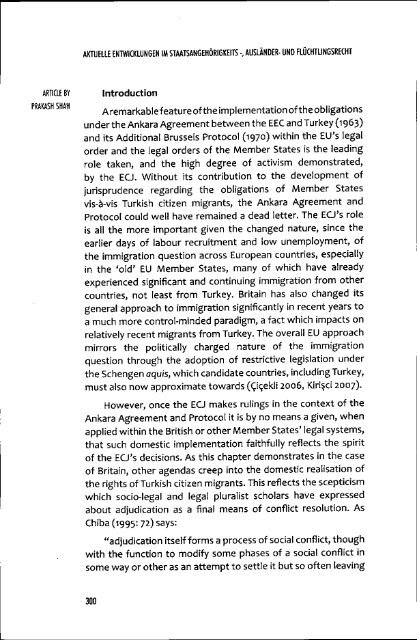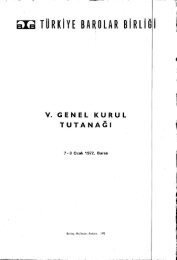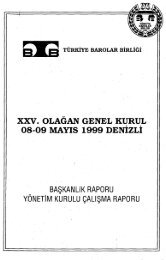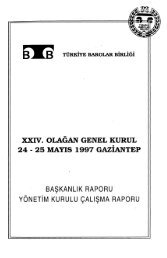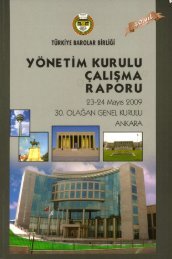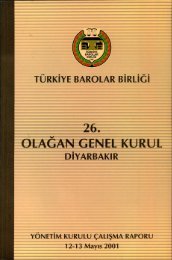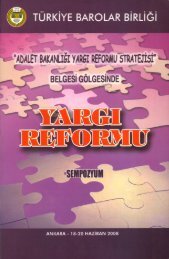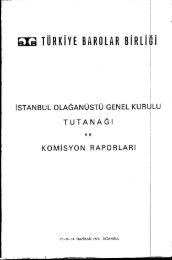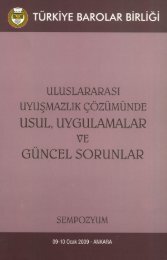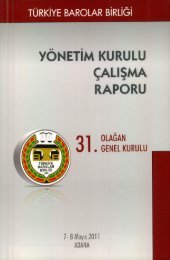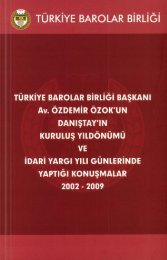- Page 1 and 2:
TORKiYE BAROLAR BiRÙ G%i.Uluslarar
- Page 3 and 4:
Türkiye Barolar Birli ği Yayınla
- Page 5 and 6:
Anadolu Üniversitesi Hukuk Fakült
- Page 7 and 8:
Prof. Dr. Vahit DoğanTürk Vatanda
- Page 9 and 10:
Dr. Frauke BembergProbleme hinsicht
- Page 11 and 12:
pozyumda sunulan bildirilerin yay
- Page 13 and 14:
Es scheint auf den ersten Blick ver
- Page 15 and 16:
VATANDAŞLIK, GÖÇ, MÜLTECI VEYAB
- Page 17 and 18:
AKTIJELII ENTWI(KLUNGEN 1M STAATSAN
- Page 19 and 20:
AKTIJELLE ENTWICKLUNGEN 1M STMJSANG
- Page 21 and 22:
AKTUELIE ENTWICRLÜNGEN 1M STAATSAN
- Page 23 and 24:
AKTİJELLE E)ITW İ (KLUNGEN 1M STM
- Page 25 and 26:
AIÇİİJEILE ENm1CKLUNGEN 1M STMrS
- Page 27 and 28:
AXTUELİE ENTWICKIUNGEN 1M STAATSAN
- Page 29 and 30:
AKUELtE ENmIcKLuNG£N 1M STMTSArIGE
- Page 31 and 32:
AKTUELIE ENTWIO(LUNGEN 1M STMTSANGE
- Page 33 and 34:
A ı(TLJEU.E EN İWICKLIJNGEM 1M ST
- Page 35 and 36:
YEN İ TÜRK VATANDAŞLIĞI KANUNU'
- Page 37 and 38:
AKTUELLE ENTW İ CKWNGEN 1M STMTSAN
- Page 39 and 40:
AKTIJELLE ENTWICKLUNGEN 1M STAArSAN
- Page 41 and 42:
AKTUELLE ENIWI(KLJjNGEN 1M SrLATSAN
- Page 43 and 44:
AKTIJELLE ENTWICKLIJNGEN 1M STMTSAN
- Page 45 and 46:
LIAKTUELLE ENIWICKILJNGEN 1M STMTSA
- Page 47 and 48:
AKTIJELI.E ENIWICKI.UNGEN 1M STAATS
- Page 49 and 50:
1M STAATSANCEIIÖRIGKEITS -, AUSLAN
- Page 51 and 52:
AKİİJELLE ENTWICKWNGEN 1M STAATSA
- Page 53 and 54:
AKTIJELLE ENTWICKLUNGEN 1M STAATSAN
- Page 55 and 56:
AKTUFILE ENTWICKIJJNGEN 1M STAATSAN
- Page 57 and 58:
AKTURLE ENTW İ CKLUNGEN 1M STMTSAN
- Page 59 and 60:
AKTUELLE ENTWICKLUNGEN 1M STMTSANGE
- Page 61 and 62:
AKTIJELLE EMIWICKLIJNGEN 1M STAATSA
- Page 63 and 64:
AKTUEILE ENTWIO
- Page 65 and 66:
AKFUELIE ENTW İ CKIUNGEN 1M STAATS
- Page 67 and 68:
1M STMTSANGEHÖR İ GKEITS -, AUSL.
- Page 69 and 70:
AKTUELIE ENTWICKUJNGEN 1M STMTSANGE
- Page 71 and 72:
AKTU ELLE ENTWICKIUNGEN 1M STAATSAN
- Page 73 and 74:
AKIUEIL( ENTWICKLUNGEN 1M STAArSANG
- Page 75 and 76:
AKTUELLE ENTWICKLUNGEN 1M STAATSANG
- Page 77 and 78:
AKTUEIIE ENTWICK WNGEM 1M STAArSANG
- Page 79 and 80:
AKTOELIE ENTWICKLUNGEN 1M STALATSAN
- Page 81 and 82:
AKİİJEUI EMJWICKLUNGEM 1M STAATSA
- Page 83 and 84:
AI(UELLE ENTW İ CKLUNGEN 1M STMISA
- Page 85 and 86:
AKTIJELLE EN İWICKLW
- Page 87 and 88:
AKTIJELLE ENTW İ (KUJNGEN 1M STAAT
- Page 89 and 90:
AKTUELLE ENIWICKLUNGEN 1M STAATSANG
- Page 91 and 92:
AKTUEIIE ENrWICKLUNGEN 1M STMTSANGE
- Page 93 and 94:
AKTIJELLE ENIWICK WNGEN 1M STMrSANG
- Page 95 and 96:
AKTUELI.E ENTW İ (KLUNGEN 1M STAAT
- Page 97 and 98:
AICrURLE ENTWI(KLIJNGEN 1M STMTSANG
- Page 99 and 100:
AKTUELLE ENTWI(KLUNGEN 1M STMTSANGE
- Page 101 and 102:
AKTUELI.E ENTWI(KLIJNGEN 1M STAATSA
- Page 103 and 104:
AKİİJELLE ENTWI(KLUNGEN 1M STAATS
- Page 105 and 106:
AKTUELLE ENTWICKIUNGEN 1M STAATSANG
- Page 107 and 108:
AVRUPA VATANDAŞLIK SÖZLEŞMES İ
- Page 109 and 110:
AKTUELI.E ENTWIcKLUNGEN 1M STAATSAN
- Page 111 and 112:
AKTİJELLE ENIWICKLİJNGEN 1M STMTS
- Page 113 and 114:
AKIUELI.E ENTWICKLUNGEN 1M STAL4TSA
- Page 115 and 116:
AKTUELI.E ENIWICKLUNGEN 1M STAATSAN
- Page 117 and 118:
AKTUELLE ENTW İ CKLUNGEN tM STMTSA
- Page 119 and 120:
AKTUELLE ENIWICKLUNGEN 1M STMTSANGE
- Page 121 and 122:
AKTUELIi (N1WICKLUNGEN 1M srAATSANG
- Page 123 and 124:
AKTUELIE ENTWICKLIJNGEN 1M STAATSAN
- Page 125 and 126:
DAS DEUTSCHE STAATSANGEHÖRIGKEITSG
- Page 127 and 128:
AKTIJELLE EMTWICKLUNGEN 1M STAATSAN
- Page 129 and 130:
AKTUELLE ENTWICKLUNGEN 1M STMTSANGE
- Page 131 and 132:
AKJUEU.E ENMICNwNGEN 1M STAATSANGEH
- Page 133 and 134:
AKTU ELLE EN İWICKLIJNGEN 1M STMTS
- Page 135 and 136:
AKTUELLE ENTW İ CKLUNGEN 1M STMTSA
- Page 137 and 138:
AKTUE ILE ENTWIO(LIJNG£N fM STMTSA
- Page 139 and 140:
AKUELLE ENm1ckUJNGEN 1M srAA ı'SAN
- Page 141 and 142:
AKTLJELLE ENTW İ CKLUNGEN 1M STAAT
- Page 143 and 144:
AKTIJELLE ENTWICKLUNGEN 1M STAATSAN
- Page 145 and 146:
AKTURLE ENTW İ CKLUNGEN 1M STMTSAN
- Page 147 and 148:
AKTIJELLE ENTWICKLLJNGEN 1M STMrSAN
- Page 149 and 150:
AKTİJELLE ENTWI(KLUNGEN 1M STAATSA
- Page 151 and 152:
AKTUELLE (NTWICKIUNGEN 1M STAATSANG
- Page 153 and 154:
AKTUELLE ENTWIcKWNGEN 1M STAATSANGE
- Page 155 and 156:
AKTUELLE ENTWICKLIJNGEN 1M STMTSANG
- Page 157 and 158:
AKUELLE ENTWICKLUNCEN 1M STMTSANGEH
- Page 159 and 160:
AKTUELLE ENTWIO
- Page 161 and 162:
AKTİJELLE ENIWICKLIJNGEN 1M STMJSA
- Page 163 and 164:
AKTIJELLE ENTW İ CKLUNGEN 1M STMTS
- Page 165 and 166:
AKTIJEU.E ENTWIO(WNGEN 1M STAATSANG
- Page 167 and 168:
TÜRK HUKUKUNDA"Ç İFTE VATANDAŞL
- Page 169 and 170:
AKTİJELLE ENTWICKLUNGEN 1M STAATSA
- Page 171 and 172:
AKTUELLE ENTWICKLUNGEN 1M SrAATSANG
- Page 173 and 174:
AKTUELLE ENIWIO(LIJNGEN 1M STAATSAN
- Page 175 and 176:
AKTUEUI ENTWKKWNGEN 1M STMTSANGEHÖ
- Page 177 and 178:
AKTIJELLE ENTWKKLIJNGEN 1M STMTSANG
- Page 179 and 180:
AKTUELIE ENTWIO(LIJNGEN 1M STAATSAN
- Page 181 and 182:
AKTIJELLE ENTWICKLUNGEN 1M STMTSANG
- Page 183 and 184:
AKTIJELLE ENTWICKILJNGEN 1M STMTSAN
- Page 185 and 186:
AKTUELL[ ENTWI(KLUNGEN 1M STMTSANGE
- Page 187 and 188:
AKUJELLE ENTWICKUJNGEN 1M STMTSANGE
- Page 189 and 190:
AKTUELLE ENTWICKLIJNGEN 1M STMTSANG
- Page 191 and 192:
AKTIJELLE ENTWICKLUNGEN 1M STAAJSAN
- Page 193 and 194:
AKTUFILE ENIWICKLUNGEN 1M STAATSANC
- Page 195 and 196:
AKTIJELLE ENTWICKLUNGEN 1M SrAATSAN
- Page 197 and 198:
(35 EXPERIENCE WITH DOUBLE CITIZENS
- Page 199 and 200:
AKTIJELLE ENJWICKLUNGEPI 1M STAATSA
- Page 201 and 202:
AKJUELLE ENTWICKIIJNGEN 1M STAATSAN
- Page 203 and 204:
AKTUELU ENTWICKIUNGEN 1M STAATSANGE
- Page 205 and 206:
AKTUELLE ENTWICKLUNCEN 1M STAATSANG
- Page 207 and 208:
AI(TUELLE ENTWICKLUNGEN 1M STAArSAN
- Page 209 and 210:
AKTUEIİE ENTWICKUJNGEN IM STMTSANG
- Page 211 and 212:
AKTUELLE ENTWICKLUNGEN 1M STALATSAM
- Page 213 and 214:
AKTUELLE ENTW İ CKLUNGEN 1M STAATS
- Page 215 and 216:
AKTİJELLE ENTW İ (KLUNGEN 1M STMT
- Page 217 and 218:
TÜRK VATANDAŞLIĞINDAN AYRILAN VE
- Page 219 and 220:
AIcruaLE ENİWICKIUNGEN 1M STAATSAN
- Page 221 and 222:
AKTUELLE (NTWICKWNGEN 1M STMTSANGEI
- Page 223 and 224:
AKİİJELI.E ENTWICKLUNG£N 1M STAA
- Page 225 and 226:
AKJLJELLE ENTWICKIUNGEM 1M STAATSAN
- Page 227 and 228:
1M STMTSANGEHÖR İ GKEITS -, AUSL
- Page 229 and 230:
AKTUELLE ENTWI(KLLJNGEN 1M STMrSANG
- Page 231 and 232:
AKTIJEU.E ENTWICXUJNGEN 1M STL4rSAN
- Page 233 and 234:
AKIİJELLE ENTWI(KLUMGEN 1M STAATSA
- Page 235 and 236:
AKrUEI.LE ENTWIO(LUNGEN 1M STMTSANG
- Page 237 and 238:
AKİİJE İLE ENJWICKLIINGEN 1M STL
- Page 239 and 240:
AKTUELLE ENTW İ CKLUNGEN 1M STMTSA
- Page 241 and 242:
AKTUELLE ENTWICKLUNGEN 1M STMTSANGE
- Page 243 and 244:
AkTUELLE ENTWICKLUNGEN 1M STMTSANGE
- Page 245 and 246:
AKTUELI.E ENTWIO(WNGEN 1M STMTSANGE
- Page 247 and 248:
AKTIJELLE ENIWICKLUNGEN 1M STAATSAN
- Page 249 and 250:
AKTUEI.1E ENTWICKIIJNGEN 1M STAATSA
- Page 251 and 252:
AKTUELIE ENİWICKL[JNGEN 1M STAATSA
- Page 253 and 254:
AKTU ELLE ENTWICKLUNGEN 1M STMTSANG
- Page 255 and 256:
AKTUELLE ENTWICKLUNGEN 1M STAATSANG
- Page 257 and 258: AKTIJELI.E ENT%VICKLUNGEN 1M STMTSA
- Page 259 and 260: AKYUEI.LE ENTWICKLUNGEN 1M STMTSANG
- Page 261 and 262: AKTUELLE ENTWICKLUNGEN 1M STMTSANGE
- Page 263 and 264: VATANDAŞLIK, GÖÇ, MÜLTEC İ VEY
- Page 265 and 266: AIGUELLf ENTWICKLLJNGEN 1M ST4ATSAN
- Page 267 and 268: AKTUFILE ENIWI(KLUNGEN 1M STAATSANG
- Page 269 and 270: DIe Schweiz hat in Europa gemeinhin
- Page 271 and 272: AICFUFIE ENTWICKUJNGEN 1M STMTSANGE
- Page 273 and 274: AKTIJELLE ENTWICKILJNGEN 1M STA.ATS
- Page 275 and 276: AKTUEI.LE ENTWICKLUNGEN 1M STMTSANG
- Page 277 and 278: AKTLJELLE ENTWICkLIJNGEN 1M STMTSAN
- Page 279 and 280: AKTUELLE ENTWI(KLUNGEN 1M STAMSANGE
- Page 281 and 282: AKTUELLE ENIWICK[UNGEN 1M STAATSANG
- Page 283 and 284: AKTİJELLE ENTWICKLUNGEN 1M STMTSAN
- Page 285 and 286: AKI UELI.E ENTWICKLUNGEN 1M STAATSA
- Page 287 and 288: ENTWICKLUNGSTENDENZEN UND PRIORITAT
- Page 289 and 290: AKTUELLE ENJWICKLUNCEN 1M SIMTSANGE
- Page 291 and 292: AKTUELLE ENİWICKIUNGEN 1M SJMTSANG
- Page 293 and 294: AKTİJELLE ENJWICKLUNGEN 1M STAATSA
- Page 295 and 296: AKTIJE İLE ENTW İ CKLUNGEN 1M STA
- Page 297 and 298: AKTUELLE ENTWICKLUNGEN 1M STAATSANG
- Page 299 and 300: AKrUEaE ENTWICKLUNGEN 1M STMTSANGE
- Page 301 and 302: AKUELLE ENTWICKLUNGEN 1M STAATSANGE
- Page 303 and 304: AKrUELLE ENTWICKLUNGEN 1M STMTSANGE
- Page 305 and 306: AKTLJELLE ENIWICKLUNGEN 1M STM İ S
- Page 307: AKTUELIE ENTWICKWNGEN 1M STMTSANGEH
- Page 311 and 312: AKTUELLE ENTWICKLLJNGEN 1M STAATSAN
- Page 313 and 314: AKTIJELIL ENJWICKLUNGEN 1M STAATSAN
- Page 315 and 316: AKTUELLE EMIWICKLIJNGEM 1M STLATSAN
- Page 317 and 318: AKTIJELLE ENIWICKLUNGEN 1M STAATSAN
- Page 319 and 320: AKTIJELLE ENTWICKLIJNGEN 1M STMrSAN
- Page 321 and 322: AKTULILE ENTWICKLUNGEN 1M STMTSANGE
- Page 323 and 324: AKTUELLE ENTWICKLUNGEN 1M STMTSANGE
- Page 325 and 326: AKTUELLE ENTWICKLUNGEN 1M STMTSANGE
- Page 327 and 328: AKTUELLE ENTWICKLIJNGEN 1M STMTSANG
- Page 329 and 330: AKTUELLE ENTWIO
- Page 331 and 332: ARTIJELLE ENTWICKLUNGEN 1M STMTSANG
- Page 333 and 334: AICTL$ELIE ENTWICKLUNGEN 1M STMTSAN
- Page 335 and 336: AKTLIEIIE ENTWICKLIJNGEN 1M STAATSA
- Page 337 and 338: AKTUELLE ENTWICKLUNGEN 1M STMTSANGE
- Page 339 and 340: AKTUELLE ENTW İ CKLUNGEN 1M STAATS
- Page 341 and 342: AKTUELLE ENTWICKWNGEN 1M STMTSANGEH
- Page 343 and 344: AI(ruEuı ENTWICI
- Page 345 and 346: AKTUELLE ENTWICKIUNGEN 1M STMTSANGE
- Page 347 and 348: AKTUELLE ENTWICKIUNGEN 1M STMTSANGE
- Page 349 and 350: AKTLJELLE ENTWI(KLUNGEN 1M STAATSAN
- Page 351 and 352: AKTUEaE ENTWICKWNGEN 1M STMTSANGEH
- Page 353 and 354: AKİİJELLE ENTWIO(LLJNGEN 1M STAAT
- Page 355 and 356: AKTUZLIL ENIWICKUJNGEN 1M STMTSANGE
- Page 357 and 358: AKTUELI.E ENTW İ CKLUNGEN 1M STAAr
- Page 359 and 360:
AKUELLE ENIWICKIUNGEN 1M STAATSANGE
- Page 361 and 362:
AKTUELLE ENTWI(KLUNGEN 1M STAATSANG
- Page 363 and 364:
AKrLIELLE ENm1CK1UNGEN 1M STMrSANGE
- Page 365 and 366:
AKTUELLE ENTWKKLUNGEN 1M STAATSANGE
- Page 367 and 368:
AKTUELIE ENTWICKIJJNGEN 1M STMTSANG
- Page 369 and 370:
1M srk4rsANGEHÖR ı GKE ırs -I AI
- Page 371 and 372:
AKİUELLE EMIWICKLUNGEN 1M STMTSANG
- Page 373 and 374:
M(TUELLE ENIWICKLIINGEN fM STMTSANG
- Page 375 and 376:
AKİİJELLE ENTWICKIIJNGEN 1M STAAT
- Page 377 and 378:
AKTUELLE ENTWICKLIJNGEN 1M STMTSANG
- Page 379 and 380:
AKTU ELLE ENTWICkLIJNGEN 1M STAATSA
- Page 381 and 382:
ARTUELLE ENIWICKWNGEN 1M STAATSANGE
- Page 383 and 384:
AKTIJELLE ENIWICKI.UNGEN 1M STMTSAN
- Page 385 and 386:
AKTUEILE ENTWICKLUNGEN 1M STMTSANGE
- Page 387 and 388:
AKİBEL!.E ENTWICKLUNGEN 1M STMTSAN
- Page 389 and 390:
AKİİJELLE ENTWI(KWNGEN 1M STAATSA
- Page 391 and 392:
AKTIJEU.F ENTW İCKLUNGEN 1M STAATS
- Page 393 and 394:
AIÇIJELLE ENTWICKLUNGEN 1M STAATSA
- Page 395 and 396:
AKTUEILE ENIWICKLUNGEN 1M STAATSANG
- Page 397 and 398:
AKTUELLE ENm1CKLuNGEN 1M STAATSANGE
- Page 399 and 400:
AKTLJEE ENTWICKLUNGEN 1M STAArSANGE
- Page 401 and 402:
AKrIJELI.E ENrWICKWNGEN 1M STAATSAN
- Page 403 and 404:
VATANDAŞLIK, GÖÇ, MÜLTECI VEYAB
- Page 405 and 406:
AKTUEI.LE ENIWICKUJNGEN 1M SrAArSAN
- Page 407 and 408:
AKflJEILE ENTWICKIUNGEN 1M STA£ATS
- Page 409 and 410:
AKTUELLE ENIWICKLIJNGEN 1M STMTSANG
- Page 411 and 412:
AI
- Page 413 and 414:
AKTUELLE ENTWICKLIINGEN 1M STAATSAN
- Page 415 and 416:
AKTU ELLE ENTWICKIUNGEN 1M STAATSAN
- Page 417 and 418:
AKTIJELLE ENTWICKLUNGEN 1M STAArSAN
- Page 419 and 420:
AKTUE ILE ENIWICKLLJNGEN 1M STAArSA
- Page 421 and 422:
AKTUELLE ENTWICKLUNGEN 1M STMTSANGE
- Page 423 and 424:
AKTUELLE ENTWICKWNGEN 1M STMTSANGEH
- Page 425 and 426:
AKTUELLE ENIWICKIUNGEN 1M SrAATSANG
- Page 427 and 428:
AKTUEILF ENTWICKLUNGEN 1M STAATSANG
- Page 429 and 430:
A İGIJRLE ENTWICKLUNGEN 1M STMTSAN
- Page 431 and 432:
AKUJELLE ENTWICKLUNGEN 1M STAATSANG
- Page 433 and 434:
AKTUELtE E İITWICKLUNG(N 1M STAATS
- Page 435 and 436:
AktIJELI.E ENIWICKLUNGEM 1M STMTSAN
- Page 437 and 438:
AKİİJELLE ENTWICXLIJMGEN 1M STMTS
- Page 439 and 440:
AICTUELIE ENTWICKLUNGEN 1M SrAATSAN
- Page 441 and 442:
AKTIJELLE ENTWICKLUNGEN 1M STAArSAN
- Page 443 and 444:
AKUELLE ENTWJO(LIJNGEN 1M STMTSANGE
- Page 445 and 446:
AKIUELLE ENIWICKIUNGEN 1M STMTSANGE
- Page 447 and 448:
AKTUELLE ENTWICKLUNGEN 1M STAATSANG
- Page 449 and 450:
AKTIJE İLE ENTWICKLUNGEN 1M STAATS
- Page 451 and 452:
AKTU(LLE ENIWICKUINGEN 1M STMTSANGE
- Page 453 and 454:
AKTUELLE ENmICKLuNGEN 1M STMTSANGEF
- Page 455 and 456:
AKflJELLE ENIWIO(LUNGEN !M STAATSAM
- Page 457 and 458:
ARTUELLE ENIWICKLuNGEN 1M STAATSANG
- Page 459 and 460:
AKTU( ııt ENIWIO(IUNGEN 1M SrMTSA
- Page 461 and 462:
AKTULILE ENTWICKLUNGEN 1M STMISANGE
- Page 463 and 464:
AKJUELLE ENTWICKLUNGEN FM STAArSANG
- Page 465 and 466:
AKIUELIL ENTWICKLUNGEN 1M SrAATSANG
- Page 467 and 468:
AKTULILE ENTWICKLUNGEN 1M STAATSANG
- Page 469 and 470:
AICIİJEIİE ENTWICKLUNGEN 1M STAAT
- Page 471 and 472:
AKTIJELLE ENTWJCKLIJNGEN 1M STAATSA
- Page 473 and 474:
AKTıJELI.E EMIWICKLUNGEN 1M STMTSA
- Page 475 and 476:
AKTUEILE ENTWJcKLUNGEN 1M STAATSANG
- Page 477 and 478:
AKTIJELLE ENIWICKLUNGEN 1M STMTSANG
- Page 479 and 480:
AKTLIELLE ENTWICKLUNGEN 1M STMTSANG
- Page 481 and 482:
AKTUEILE ENTWICKLIJNGEN 1M STAAtSAN
- Page 483 and 484:
1M STAATSANGEHÖR İ GKE İ TS -, A
- Page 485 and 486:
AKTUE İLE ENTWICKLUNGEN 1M SrAATSA
- Page 487 and 488:
A İGİJELLE ENİWICKILJNGEN 1M STM
- Page 489 and 490:
AKTUEI.LE ENTWICKLUNGEN 1M STkATSAN
- Page 491 and 492:
AKİİJELLE ENTWICKLUNGEN 1M STMrSA
- Page 493 and 494:
AKTUELLE ENTWICKLUNGEN 1M STA4JSANG
- Page 495 and 496:
AKTUELIi (NTWICKLUNGEN 1M STAATSANG
- Page 497 and 498:
AKUEL1E ENTWICKLUNGEN 1M STAATSANGE
- Page 499 and 500:
PROBLEME HINSICHTL İ CH SOZ İALER
- Page 501 and 502:
AKİİJELI.E ENTWICKLLJNGEN 1M STMT
- Page 503 and 504:
AKTUEI.LE ENIWI(KLIJNGEN 1M STA4TSA
- Page 505 and 506:
DOĞRUDAN YABANCI YATIRIMLAR VEYABA
- Page 507 and 508:
AKTUELLE EMTWKKLUNGEN 1M STAATSANGE
- Page 509 and 510:
AI(flJELLE ENIWICKLUNGEN 1M STMTSAM
- Page 511 and 512:
AKTUELLE ENIWICKLUNGEN 1M SrMTSANGE
- Page 513 and 514:
AKTUELIE ENTWIO(LUNGEN 1M STLATSANG
- Page 515 and 516:
AKTUELLE ENTWICKLUNGEN IV STAATSANG
- Page 517 and 518:
AKTUELLE ENTWICKLUNGEN 1M STMTSANGE
- Page 519 and 520:
AKTIJELLE ENTWICKLUNGEN 1M STAA İS
- Page 521 and 522:
AXTUELLE ENm1CKLUNGEN 1M STAATSANGE
- Page 523 and 524:
AKTUELLE ENİWICKLUNGEN 1M STMTSANG
- Page 525 and 526:
AKTU ELLE ENTWICKLUNGEN 1M STMTSANG
- Page 527 and 528:
AKTIJE İLE ENTWICKLtJNGEN 1M STMTS
- Page 529 and 530:
TÜRK İDARİ YARGISINDA SINIR DI
- Page 531 and 532:
AKTUELLE ENTWICKLUNGEN 1M STAATSANG
- Page 533 and 534:
AKİİJELLE EN İWICKLLJNGEN 1M STM
- Page 535 and 536:
AKTIJELIL EHTWI(KLUNGEN 1M STMTSANG
- Page 537 and 538:
AKTUELLE ENTW İ CKLIJNGEN 1M STMTS
- Page 539 and 540:
AKTIJELLE ENIWI(KLIJNCEN 1M SrAATSA
- Page 541 and 542:
1M STAATSANGEHÖRIGKEITS -, ALISLAN
- Page 543 and 544:
AKTIJELLE ENIWICKLIJNGEN 1M STMTSAN
- Page 545 and 546:
AKTLJEL!.E ENTWICKLIJNGEN 1M STMİ'
- Page 547 and 548:
AKİİJELLE ENTWICKLUNGEN 1M STAATS
- Page 549 and 550:
AKTIJELLE ENTWICKLUNGEN 1M STAATSAN
- Page 551 and 552:
AXTIJELLE EPITWKKLUNG(N 1M STAATSAN
- Page 553 and 554:
AKTUELLE ENTWICKLIJNGEN 1M STAArSAN
- Page 555 and 556:
AKTUELLE ENIWICKLUNGEN 1M STAATSANG
- Page 557 and 558:
AKTUELLE ENTWİ (KIUNGEN 1M SrMrSAN
- Page 559 and 560:
AKTUELLE ENİWIOCLLJNGEN 1M STMTSAN
- Page 561 and 562:
AKTUELI.E ENTWICKLUNGEN 1M STAATSAN
- Page 563 and 564:
AKTUELLE ENTW İ CKIUNGEN 1M STMTSA
- Page 565 and 566:
AKTUEU.E EMTWICKLUNGEN 1M STMTSANGE
- Page 567 and 568:
AKTUELLE ENTWI(KLUNGEN 1M STMTSANGE
- Page 569 and 570:
RECHTSSCHUTZ FÜR AUSLANDER GEGEN M
- Page 571 and 572:
AKTUELLE ENTWkKLUNGEN 1M STAATSANGE
- Page 573 and 574:
AKUE1LE ENTWICKIUNGEN 1M STAATSANGE
- Page 575 and 576:
AKTİJEIIS ENİWICKLUNGEN 1M STLATS
- Page 577 and 578:
AKTUELLE ENTWICKIUNGEN 1M STAATSANG
- Page 579 and 580:
AKTUEU.E ENİWIO(WNGEN 1M STMTSANGE
- Page 581 and 582:
AKTIJELLE ENTW İ CKLUNGEN 1M STMTS
- Page 583 and 584:
AlçrUELLE ENTWICKL(JNGEN 1M STAATS
- Page 585 and 586:
AKTU ELLE ENİWICKLIINGEN 1M STMTSA
- Page 587 and 588:
AKTUELLE ENTWICKLUNGEN 1M STAATSANG
- Page 589 and 590:
AKTUELLE ENTWICKLLJMGEN 1M STAATSAN
- Page 591 and 592:
AKTIJELLE ENTWICKLUNGEN 1M STAArSAN
- Page 593 and 594:
AKTUELLE ENTWICKI.LJNGEN 1M STAATSA
- Page 595 and 596:
AKIIJEILE ENIWICKLIJNGEN 1M STMTSAN
- Page 597 and 598:
AKTUEIIE ENTWICKLUNGEN 1M STAATSANG


